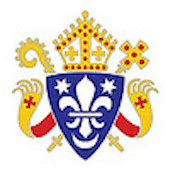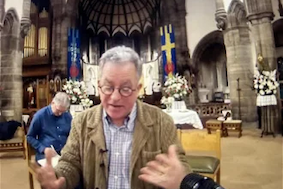Bishops Conference on the Synodal Process

Source: CBCEW
As we journey together towards the Synod of Bishops meeting in Rome in 2023 that examines the synodal church in the 21st century, the Bishops' Conference of England and Wales has issued the following statement on the process.
Introduction
The title of the 2023 Synod of Bishops is For a Synodal Church: Communion, Participation, Mission.
For the first time, the Synod Office in Rome has produced a comprehensive process which encompasses the stated aim of the Holy Father that the Church in today's world should have a vision of missionary communion orientated to evangelisation.
The process begins in the Particular (or Local) Church and then moves to the level of the Bishops' Conference. From there, discernment takes place in the Regional Area - for England and Wales, it would be steered by the European Council of Bishops' Conferences (CCEE) - before moving to the Universal Church with the final Synod Gathering of Bishops in 2023, sub et cum Petro.
Origins
The process reflects the teaching of the Second Vatican Council in the Dogmatic Constitution on the Church, Lumen Gentium. In this Council Document, the universality of the People of God is affirmed (LG-12) and by their anointing in the Holy Spirit, the universal body is "incapable of being at fault in belief." A presupposition for this important statement is a formation of the people in a lived experience of faith, foreshadowed in the Old Testament especially in the Exodus, from which the life of the Gospel is lived by those united to Christ in his new covenant (LG-9).
The sacrament of Baptism offers entry into the life of faith and love. The Eucharistic liturgy is the pre-eminent place that the Christian community gathers to celebrate this faith and love. So, the People of God celebrate this life of faith and love in the context of the Scriptures and the Eucharist. Thereby their faith in the Word of God and in the Tradition of the Church, through the Scriptures and the teaching office of the Church, is affirmed and nurtured. Faith is nourished through the hearing of the Word and the sharing of the Body of the Lord. Through these actions, the members of the Church enter into communion with him and all each other.
The importance of the Bishop
From this universal people, the bishops are chosen and consecrated and have an attention to the whole flock but, in particular, to the Church to which they have been appointed (LG-23). Their ministry is one of "pastors, masters of teaching, priests of sacred worship, ministers of government." Theirs is the charism of discernment as they are the "authentic guardians, interpreters and witnesses to the faith of the whole Church."
Therefore, the bishops have a key role in listening to the people of God in their particular Church, and under the power of the Holy Spirit, to hear and discern what is being said of the Church. "In virtue of this catholicity, each part contributes its own gifts to other parts and to the entire church, so the whole and each of the parts are strengthened by the common sharing of all things and by the common effort to achieve fullness in unity." (LG -13). Each local Church is a fundamental part of the Universal Church, so what happens in each local Church contributes to the whole. It is the first link in the communion of faith shared with the other churches and cemented in the unity of the local Church around the bishop. The diversity of the local Churches and their context brings different gifts to the whole, which contribute to it. This is key to understanding this synodal pathway.
All-Many-One
The synod process is one of "journeying together" towards Christ - the Way, the Truth and the Life - who calls his people into a unity of purpose and mutual listening between people and pastors.
This journeying arrives at the Synod of Bishops gathering itself, which is presided over by the Bishop of Rome, who is called to speak as "pastor and teacher of all Christians" as the supreme witness to the fides totius Ecclesiae.
The bishops are linked to the Bishop of Rome through the bond of episcopal communion and at the same time, are subject to him as head of the College of Bishops. The process therefore can be considered as an exercise of listening all-many-one; that is, the voice of the people of God in the particular church (all), must be heard, listened to and discerned by their bishops as the authentic pastors (many), who then gather with the Successor of Peter (one) who acts as a point of unity for the Universal Church.
The ultimate discernment is for the Pope who will offer a Post Synodal Apostolic Exhortation based on what is presented to him throughout the process of mutual listening, in which the fruits of this discernment are published in a manner that reflects the life of the Church as always changing within its own context in the world, yet ever faithful to that which it has received.
Questions and Answers: www.cbcew.org.uk/bishops-conference-synodal-process-q-and-a/
Synod of Bishops Official website: www.synod.va/content/synod/en.html


















